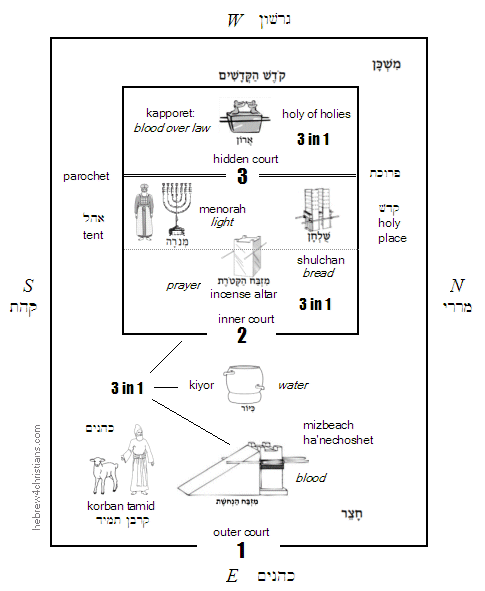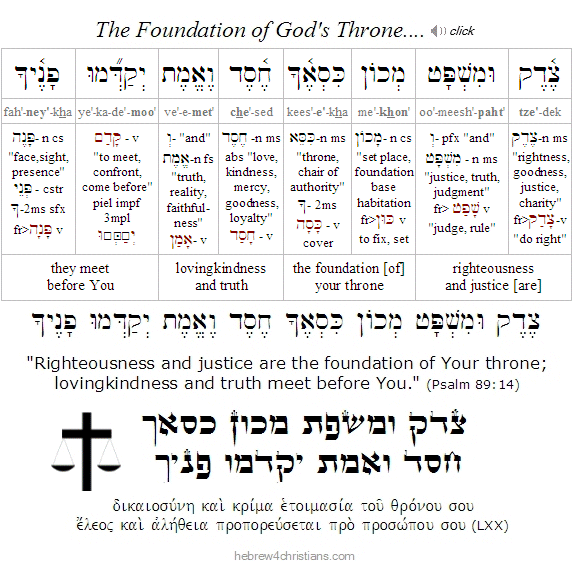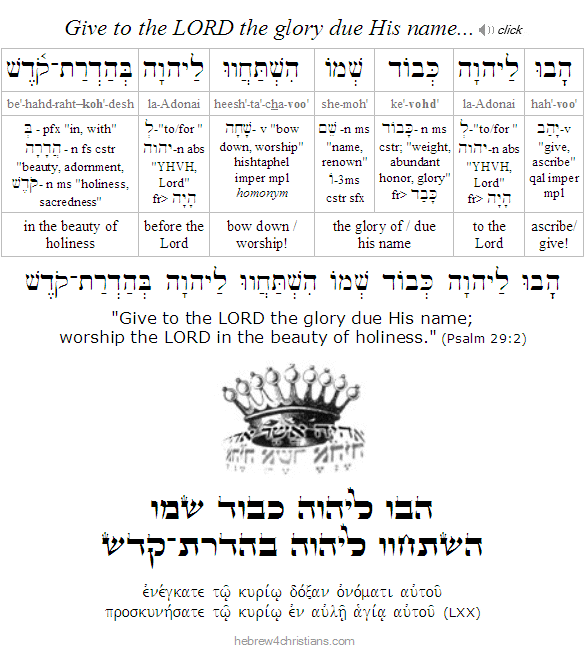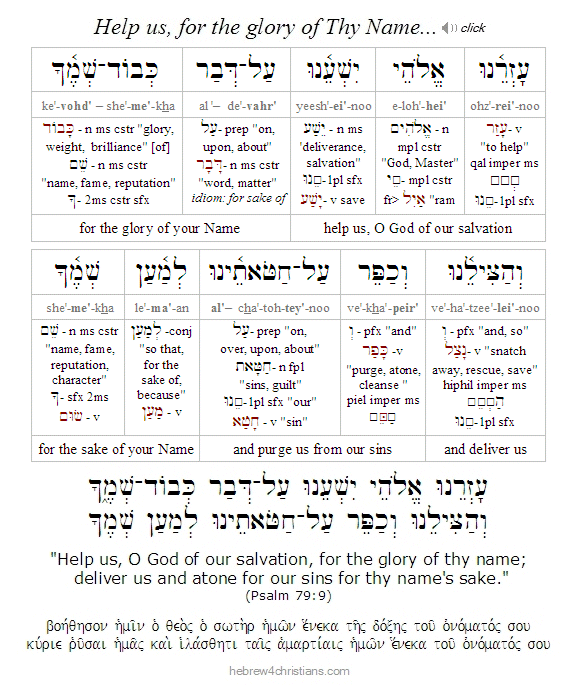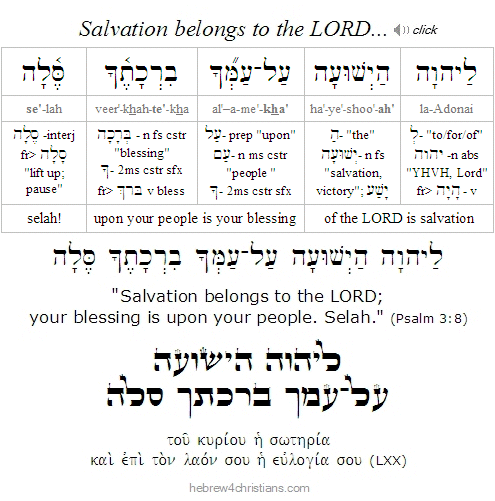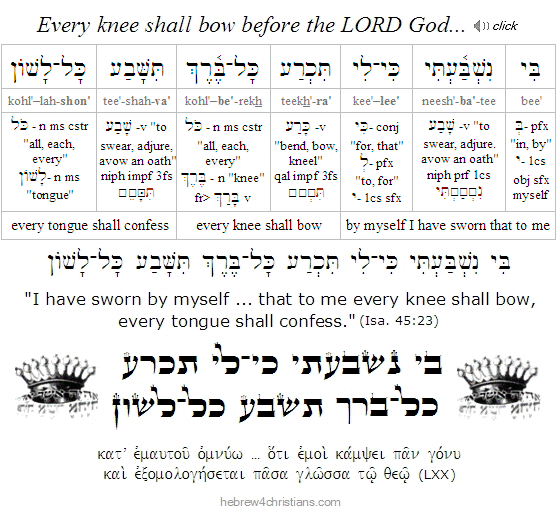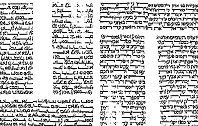|
October 2022 Updates (continued)
Note: If any page content appears to be missing, please refresh the page...
Getting Ready for Sukkot...

[ The week-long holiday of Sukkot begins Sunday, Oct. 9th at sundown this year... ]
10.06.22 (Tishri 11, 5783) It's that time again! On the Torah's calendar, there is a quick transition from the somber themes of the Jewish High Holidays (Rosh Hashanah through Yom Kippur) to the week-long celebration of Sukkot (called "Tabernacles" in the Christian tradition). If the High Holidays focus on the LORD as our Creator, our Judge, and the One who atones for our sins, then Sukkot is the time when we joyously celebrate all that He has done for us. Prophetically understood, the seven days of Sukkot picture olam haba, the world to come, and the Millennial Kingdom reign of Mashiach ben David. If Yeshua was born during Sukkot (i.e., conceived during Chanukah, the festival of lights), then another meaning of the "word became flesh and 'tabernacled with us" (John 1:14) extends to the coming kingdom age, when He will again "sukkah" with his people during the time of his reign from Zion.
Since it represents the time of ingathering of the harvest, Sukkot prophetically prefigures the joyous redemption and gathering of the Jewish people during the days of the Messiah's reign on earth (Isa. 27:12-13; Jer. 23:7-8). Indeed all of the nations that survived the Great Tribulation will come together to worship the LORD in Jerusalem during the Feast of Sukkot (Zech. 14:16-17). The holiday season therefore provides a vision of the coming Kingdom of God upon the earth, when the Word will again "tabernacle with us."
 |
This year Sukkot begins just after sundown on Sunday, Oct. 6th (i.e., Tishri 15 on the Jewish calendar). The festival is celebrated for seven days (i.e., from Tishri 15-21) during which we "dwell" in a sukkah -- a tent or "booth" of temporary construction, with a roof covering (schach) of raw vegetable matter (i.e., branches, bamboo, etc.). The sukkah represents our dependence upon God's shelter for our protection and divine providence. We eat our meals in the sukkah and recite a special blessing (leshev Ba-Sukkah) at this time.
The Lulav Bouquet...
In addition to the Sukkah (tent), the most prominent symbol of Sukkot is the Arba'at Ha-minim (אַרְבַּעַת הַמִּינִים) - "the Four Species," or four kinds of plants explicitly mentioned in the Torah regarding the festival of Sukkot: "On the first day you shall take: 1) the product of goodly trees (etrog), 2) branches of palm trees (lulav), 3) boughs of leafy trees (hadas), and 4) willows of the brook (aravot), and you shall rejoice before the LORD your God for seven days" (Lev. 23:40). We wave the "four species" (held together as a bouquet with the etrog) and recite a blessing (netilat lulav) to ask God for a fruitful and blessed year.
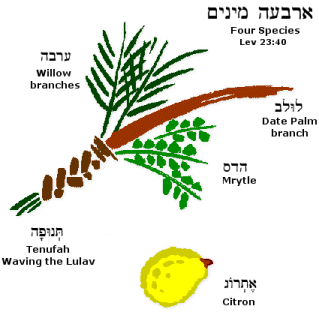 |
Sukkot marks the conclusion of the Jewish Fall Holidays and is the last of the three Shelosh Regalim (שלוש רגלים, i.e., the three annual pilgrimage festivals: Pesach (Passover), Shavuot (Pentecost), and Sukkot (Tabernacles) (Deut. 16:16). It can be argued that Sukkot is the climax of all the festivals in Scripture: Everything leads to it as a culmination in God's prophetic plan. It is interesting to compare the use of words relating to simchah [joy] in the description of these three festivals. Regarding Pesach, the word simchah does not appear at all (Deut. 17:1-8); regarding Shavuot, it appears only once (Deut. 17:11); but, regarding Sukkot, simchah appears several times. For instance:
You shall keep the Feast of Sukkot seven days, when you have gathered in the produce... You shall rejoice in your feast (וְשָׂמַחְתָּ בְּחַגֶּךָ אַתָּה)... because the LORD your God will bless you in all your produce and in all the work of your hands, so that you will be altogether joyful. (Deut. 16:13-15)
Sukkot is called "z'man simchateinu," the "season of our joy." Indeed, in ancient Israel, the joy of Sukkot was so renowned that it came to be called simply "the Feast" (1 Kings 12:32). Sukkot was a time when sacrifices were offered for the healing of the nations (Num. 29:12-40), and it was also a time when (on Sabbatical years) the Torah would be read publicly to all the people (Deut. 31:10-13).
From a spiritual perspective, Sukkot corresponds to the joy of knowing your sins were forgiven (during Yom Kippur) and also recalls God's miraculous provision and care after the deliverance from bondage in Egypt (Lev. 23:43). Prophetically, Sukkot anticipates the coming kingdom of the Messiah Yeshua wherein all the nations shall come up to Jerusalem to worship the LORD during the festival (see Zech. 14:16). Today Sukkot is a time to remember God's Sheltering Presence and Provision for us for the start of the New Year.
Hebrew Lesson
Deut. 16:13 Hebrew reading (click):
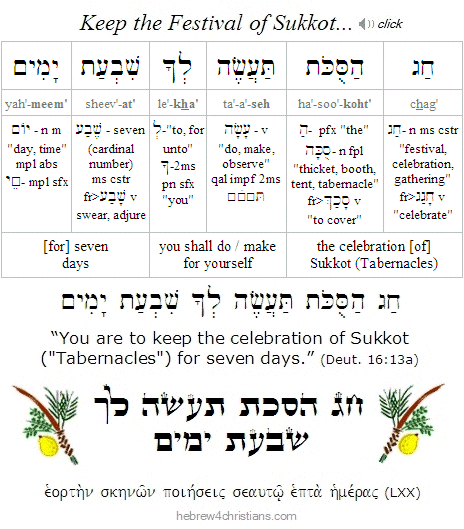 |
The Way of our Healing (דֶּרֶךְ הָרִפּוּי שֶׁלָּנוּ)
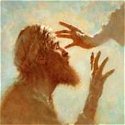
10.06.22 (Tishri 11, 5783) Repentance is an ongoing disposition of life in Messiah, since it rightly relates us to God. It is the way of our healing (דֶּרֶךְ הָרִפּוּי שֶׁלָּנוּ). First we encounter our incurable sickness - the inner contradiction and bondage of soul that both loves and hates sin - and then we seek God's saving power in Yeshua. As the Apostle Paul said: "Who can save me from the misery of myself? – God alone, through Jesus (Rom. 7:18-25). This is the first step, to know the "miserable creature that I am," that is, the slavery of your will to sin, and the second is to be willing to give this sickness of your soul to God's care in Yeshua. As he said, "Those who are well have no need of a doctor, but those who are sick. I have not come to call the 'righteous,' but sinners to repentance" (Luke 5:31-32). Yeshua regarded forgiveness of your sins as essential to finding inner healing, even more important than health, prosperity, or religious observance.
Repentance means returning to love, finding your heart's desire in God... As Yeshua said, "Repent, for you have lost your first love..." (Rev. 2:4-5). Turn around: Look at what is missing within! He appeals to you like an ardent lover standing outside in the cold, calling out your name, and knocking for you to open the door to let him inside (Rev. 3:19-20). Open the door of your heart! Return to him now! "Lord, help me turn to receive your love..."
Hebrew Lesson
Hosea 6:1 Hebrew reading (click):
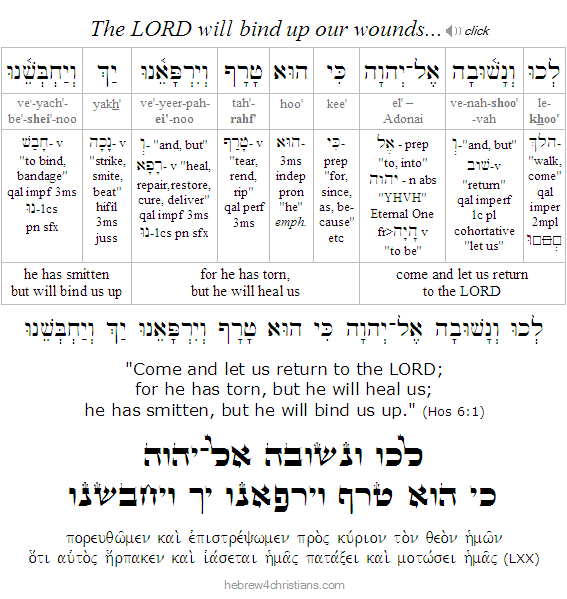 |
Atonement and the New Covenant...
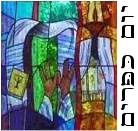
[ Understanding atonement is essential to understanding the cross of Messiah... The following provides an entry point for further study. See the Yom Kippur pages for more information. ]
10.05.22 (Tishri 10, 5783) How are we to understand the apparent contradiction that Yom Kippur is to be observed as a "statute forever" (Lev. 16:29) while the New Testament emphatically states that Yeshua puts an end to animal sacrifice and now is our eternal atonement (see Heb. 9:12; 24-26)? To begin we must note that this contradiction only arises when we make the (false) assumption that the Sinai covenant could never be abrogated, which would imply that a truly new covenant is impossible. If we can only relate to God through the covenantal terms given at Sinai, in other words, then the Levitical priesthood (alone) serves to mediate us before God, and there would be no need for a covenant based on the better priesthood and promises of the Messiah (Heb. 8:6).
However, the new covenant was clearly foretold throughout the Torah, the writings, and the prophets, and the assumption that the Sinai covenant is "immutable" is therefore false. As it is written, "Behold the days are coming, says the LORD, when I will make a new covenant (ברית חדשׁה) with the house of Israel and the house of Judah, not like the covenant that I made with their fathers (לא כברית אשׁר כרתי את־אבותם) on the day when I took them by the hand to bring them out of the land of Egypt" (Jer. 31:31-32). We can understand this by an analogy: If an employer makes a contract with an employee with certain conditional benefits that are subject to annual review, but later rescinds that contact and offers a new one with far better benefits, there is no contradiction involved. In our case a real contradiction would be occur if both the statement, "you must observe Yom Kippur forever," and then - in the same contract - it was later stated, "you no longer need observe Yom Kippur forever."
Since the Torah says of the Yom Kippur ritual, "this shall be a statute forever (חֻקַּת עוֹלָם) for you, that atonement may be made for the people of Israel once in the year because of all their sins" (Lev. 16:34), it is essential for us to better understand what "forever" might mean in this case, especially in light of the atonement given in Yeshua. First, we note that the Hebrew word translated "forever" is olam (עוֹלָם), which is derived from a root verb alam (עָלַם) that means "to conceal" or "to hide." Olam may have its origins using spatial imagery, a distance so vast that it is unseen, beyond the horizon, and therefore it can also mean "world." When it is applied to the terms of the Sinai covenant (and the Tabernacle represents the "ritual expression" of that covenant), the word means perpetual, ongoing, etc., within that semantic domain or "world." It is interesting to note that the Jewish sages never regarded "olam" as unchangeable, since in the world to come Torah will issue from Zion (see Isa. 2:3). For more on this important point, see the article "Olam HaTorah: The World of the Torah."
Hebrew Lesson
Isaiah 2:3b Hebrew reading (click):
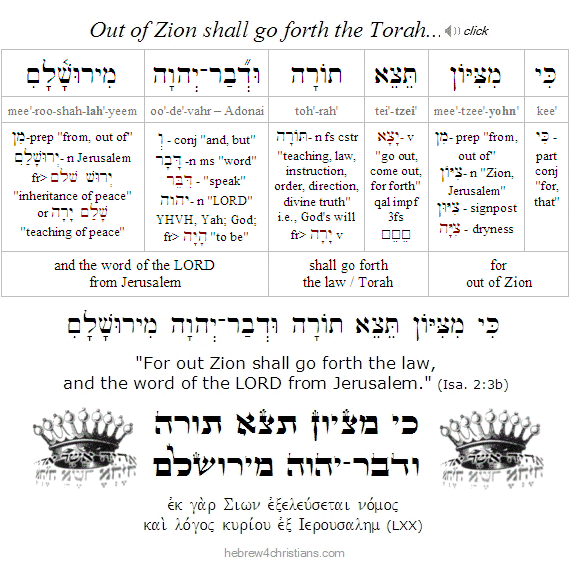 |
Second, we must remember that Torah (תּוֹרָה) is a "function word" that expresses our responsibility in light of the covenantal acts of God, and if you choose to relate to God by means of the Sinai covenant, you are legally liable to the terms and provisions of that contract (e.g., niddah laws, blood ritual laws, tithing laws, agricultural laws, etc.), and this includes being legally liable to the enumerated curses for disobedience. The covenant at Sinai is indeed eternal and never can change - it is brit olam, a perpetual covenant - but if you choose to abide by its terms, you are responsible for your side of the contract... The Book of Hebrews states: "When there is a change in the priesthood (הַכְּהוּנָּה), there is necessarily (ἀνάγκη) a change in the Torah as well" (Heb. 7:12). The Levitical priesthood expresses the Torah of the Covenant of Sinai (בְּרִית יְשָׁנָה), just as the greater priesthood of Yeshua expresses the Torah of the New Covenant (בְּרִית חֲדָשָׁה).
Third, Yeshua our Messiah came to deliver us from sin and to establish the new covenant with God, which both transcends the covenant given at Sinai and provides an entirely new way to be in relationship with God by the power of the Holy Spirit. The new covenant sets us free from the terms of Sinai (by the death of the Testator, Heb. 9:15) so that we might serve God in a new and better way (see Jer. 31:33; Rom. 7:1-6; Heb. 8:6; Rom. 9:31-32; Acts 13:39; Gal. 4:21-5:1). We "die" to the terms of the former contract to serve God in a new and powerful way (Rom. 7:1-4), with the inner intent of the law written upon our hearts (Jer. 31:31-33). This is the "deeper Torah" that goes back to the original covenant made in the Garden of Eden (for more on this, see "The Gospel in the Garden").
Fourth, Yeshua is the King, the Lawgiver of Torah, and its Substance: he did not come to destroy the Law and the Prophets, but to fulfill their message and meaning (Matt. 5:17-18; Rom. 10:4). As the King, he has the authority to annul contracts with his subjects, and he has the authority to implement new agreements based on his sovereign will... The Torah of Moses commanded, "Thou shalt not kill..." but the King of Torah (מלך התורה) went to the heart of the matter, explaining that murder was a symptom of the deeper sin of anger...
Finally, those who follow the law of Moses simply cannot keep the Day of Atonement as clearly commanded in the Book of Leviticus, nor have Jews been able to do so since 70 AD, after the destruction of the Second Temple as foretold by Yeshua (Matt. 24:2; Luke 19:41-4). Note that this was by divine design, since the way into the Holy of Holies (i.e., kodesh hakodashim: קדֶשׁ הַקֳּדָשִׁים) was not yet open for all as long as the "outer tent" still stood (i.e., the Levitical priesthood as the ritualistic expression of the covenant made at Sinai), since that was symbolic of "the present age," or the "dispensation that was passing away" (Heb. 8:13, 9:8-9; for more, see "The Parochet Rent in Two"). Despite the later invention of "Judaism without the Temple," the life is indeed "in the blood" (Lev. 17:11) and in Messiah we are given fulness of life! Only Yeshua gives us true atonement, and that's the true Torah of the LORD! The redemption obtained by animal sacrifices was merely provisional and symbolic, "for it is impossible for the blood of bulls and goats to take away sins" (Heb. 10:4). For eternal remedy something far greater was needed, namely, the sacrifice of God Himself. Consequently, when Yeshua came into the world, he said, "Sacrifices and offerings you have not desired, but a body have you prepared for me," and "'Behold, I have come to do your will, O God, as it is written of me in the scroll of the book" (Heb. 10:5,7). As the Book of Hebrew states: "We have an altar, whereof they have no right to eat who serve the Tabernacle" (i.e., the Levitical system of worship). We are cleansed from our sins and made eternally right with God because of the cross of Yeshua...
The bottom line is this. We have a greater High Priest who intercedes for us by means of his own shed blood within the true Holy of Holies, "made without hands," in the olam of reality. We do not mix the covenants of God, for this leads to double-mindedness and is regarded as spiritual adultery (Rom. 7:1-4). It is chillul HaShem - the desecration of the Name above all Names - to turn away from the meaning and message of the cross of Messiah.
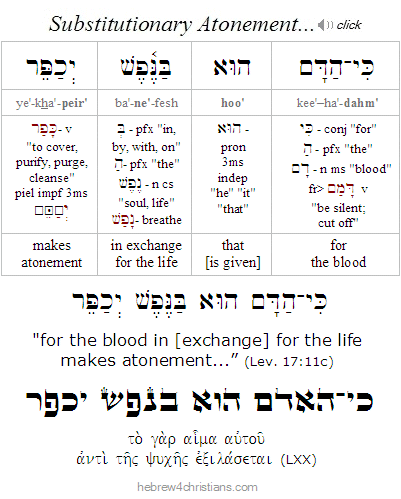 |
Addendum: So Why Study Yom Kippur?
We study the Yom Kippur avodah and the various rituals of blood atonement to better understand the meaning of Yeshua's sacrificial death for us as God's High Priest of the New Covenant. Moreover, as I've explained elsewhere on this site, Yom Kippur prophetically pictures the "Day of the LORD" or the Day of Judgment in Acharit Ha-Yamim (the End of Days). The heavenly shofar blasts heard at Mount Sinai will be reissued from Zion for all the world to hear. First will be the gathering together of those who follow the Messiah (i.e., those declared tzaddikim because of the merit of Yeshua's sacrifice), and then God's war against Satan and the world system will begin, culminating in the long-awaited coronation of the King of King of Kings. After the judgment of the nations after the Great Tribulation, ethnic Israel will be fully restored to the LORD and their sins will be completely purged (Matt. 24). "All Israel will be saved" (Rom. 11:26). Yeshua will then physically return to Israel to establish His glorious millennial kingdom in Zion. Then all the promises given to ethnic Israel through the prophets will finally be fulfilled. Like all holidays, Yom Kippur centers on Yeshua our Messiah.
Love with Trembling...

10.05.22 (Tishri 10, 5783) Our faith affirms that the LORD personally cares whether we do teshuvah, that our choices genuinely matter and bear an eternal weight of significance... If we gaze upward toward the starry depths of heaven we may feel that our lives are insignificant and useless; however, if we look within we intuitively sense that everything we say, do, and think has eternal weight. This paradox was well expressed by Immanuel Kant: "Two things fill the mind with ever new and increasing admiration and awe, the more often and steadily we reflect upon them: the starry heavens above me and the moral law within me. I do not seek or conjecture either of them as if they were veiled obscurities or extravagances beyond the horizon of my vision; I see them before me and connect them immediately with the consciousness of my existence" (Critique of Practical Reason).
True humility doesn't mean regarding your life as vain or meaningless but instead "locates" the self in spiritually realistic terms. Both the grand whorl of the cosmos and the inner mystery of the self reveal God's Presence; the LORD fills all in all, and this includes both our inner world as well as the depths of creation, yea, before heaven itself. And since God in Messiah regards your life as worthy of an infinite redemption, true humility means respecting yourself, honoring the miracle of God's presence within you, and valuing your identity as a beloved child of God... You are both a "bit of nothing" (i.e., klume: כְּלוּם) and yet you are segulah (סְגוּלָה), a treasure before heaven.
An old Chassidic tale says that every person should walk through life with two notes, one in each pocket. On one note should be the words anokhi afar ve'efer (אָנכִי עָפָר וָאֵפֶר) - "I am but dust and ashes," and on the other note should be the words, bish'vili nivra ha'olam (בִּשְׁבִילִי נִבְרָא הָעוֹלָם) - "For my sake was this world created." We are dust, yes indeed, but we are glorious dust because of God's love: "Just as we have borne the image of the man of dust, we shall also bear the image of the man of heaven" (1 Cor. 15:49).
Those who do not tremble before the cross do not understand God's holiness and anger against sin; those who do not rejoice before the cross do not understand God's great compassion and love....
We are to fear God and yet love God with all our hearts... It is a balance - the reverential "trembling of love." We fear God because our sins reveal divine justice and invoke the curse, and yet we trust what Yeshua does for us is perfect and evidences God's great compassion and mercy for our lives. So we do both - we fear God yet we rejoice that we are reconciled to him by means of the sacrificial life and death of the Messiah. We cannot choose one at the expense of the other: fear without love leads to legalism and hypocrisy; love without fear leads to presumption and profanity...
Therefore we must guard against falling into despair over ourselves by affirming God's acceptance and blessing; on the other hand we must guard against self-assurance and pride by affirming God's holiness, justice, and the terrible cost he paid to redeem us from the verdict of the law. Those who do not tremble before the cross do not understand God's holiness and anger against sin; those who do not rejoice before the cross do not understand God's great compassion and love. The cross of Messiah is the place where God's truth (justice) and God's mercy (chesed) are perfectly mediated (Psalm 85:10). The atonement is the foundation of God's throne: it is the "ground" of His heart and passion for healing us from sin... Amen, havu Adonai kevod shemo (הָבוּ לַיהוָה כְּבוֹד שְׁמוֹ) - "Give to the LORD the glory due his name!"
Hebrew Lesson
Psalm 89:14 Hebrew reading (click):
Hebrew Lesson
Psalm 29:2 Hebrew reading (click):
Yom Kippur and Prophecy...
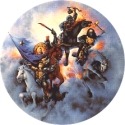
[ Yom Kippur, or the "Day of Atonement," begins this evening at sundown... ]
10.04.22 (Tishri 9, 5783) Some people might feel a certain amount of ambivalence about the holiday of Yom Kippur since it focuses on the ritual of purification for the sanctuary of the Temple, and this seems to have little to do with Yeshua and His sacrifice for our sins. After all, the Levitical system of worship is described in the New Covenant as "a shadow (σκιά) of the good things to come, instead of the true form (εἰκών) of these matters, and it can never, by the same sacrifices that are continually offered every year, make perfect those who draw near" (Heb. 10:1). Since the blood of bulls and goats cannot truly take away sins (Heb. 10:3), the sacrificial system was intended to foreshadow the coming work of Messiah, who was born to die, in accordance with God's will, and to offer his own body as a sacrifice for sin "once for all" (Heb. 10:5-10). "For by a single offering (μιᾷ γὰρ προσφορᾷ τετελείωκεν) he has perfected for all time those who are being sanctified" (Heb. 10:14).
Now while it is gloriously true that Yeshua functioned as our great High priest after the order of Malki-Tzedek by offering his blood upon the heavenly kapporet in the holy of holies "made without hands," there still is a prophetic component to this holiday that applies to ethnic Israel regarding the prophesied End of Days. After all, the realm of "shadows" still applies in the case of unbelieving Israel, who has yet to behold the unveiled glory that awaits her... Therefore the psalmist prophetically cries out, "Help us, O God of our salvation, for the glory of your Name; deliver us, and atone for our sins, for the sake of your Name" (Psalm 79:9), and this refers to the hour when Israel will call upon the LORD for salvation during the End of Days, otherwise called the great Day of the LORD. This event is prefigured in the blast of the "great shofar" which will be sounded to announce Yeshua as Israel's true Redeemer and King. Indeed, our the Messiah will one day return to Israel, cleanse her Temple, restore her to Himself, and set up His glorious kingdom.
 |
Since prophetically speaking Yom Kippur signifies ethic Israel's atonement secured through Yeshua's sacrificial avodah as Israel's true High Priest and King, there is still a sense of longing and affliction connected to this holiday that will not be removed until finally "all Israel is saved" (Rom. 11:26). So, on the one hand we celebrate Yom Kippur because it acknowledges Yeshua as our High Priest of the New Covenant, but on the other hand, we "have great sorrow and unceasing anguish in our hearts" for the redemption of the Jewish people and the atonement of their sins (Rom. 9:1-5; 10:1-4; 11:1-2, 11-15, 25-27). In the meantime, we are in a period of "mysterious grace" wherein we have opportunity to offer the terms of the New Covenant to people of every nation, tribe and tongue. After the "fullness of the Gentiles" is come in, however, God will turn His full attention to fulfilling His promises given to ethnic Israel. May that great Day of the LORD come soon, chaverim...
The judgment of God upon the USA, and indeed the world, has never been more apparent. For those with ears to hear: do teshuvah and pray. The time is near!
Perfect Love (אהבה שלמה)...
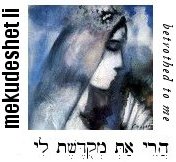
[ "Leap, then, into the arms of God... You must make the leap yourself, for God's love is not a secondhand gift." - Soren Kierkegaard ]
10.04.22 (Tishri 9, 5783) The gospel reveals God's passion for us, the call of his heart, his desire to elevate us to the role of the beloved, and we respond by accepting Him as the great Lover of our souls, the "ultimate concern" of our life.
Sin threatens to seduce us away from God's love, to interfere with our relationship, which evokes God's "jealousy" to protect love from loss.
It is written in our Scriptures that "perfect love casts out fear" (1 John 4:18), but perfect love (τελεία ἀγάπη) must be "perfect," that is, reciprocal, complete, consummated, and alive with passion. In Hebrew, perfect love is "shalem" - that is, whole, healed, and unified (i.e., ahavah shlemah: אהבה שלמה).
Perfect love is both given and received... It is not "perfect love" to intellectually accept that God loves you in Yeshua. No, you must receive this as an inward passion, you must live within it, must embrace it, take possession of it, and let it fill your heart to abundance. This love, this "perfect love," then will cast away your fear of being unwanted, rejected, and abandoned. But to know this love, you have to open your heart and accept it as your own; you have to accept yourself as the beloved of God.
Hebrew Lesson
Hosea 2:20 Hebrew reading (click):
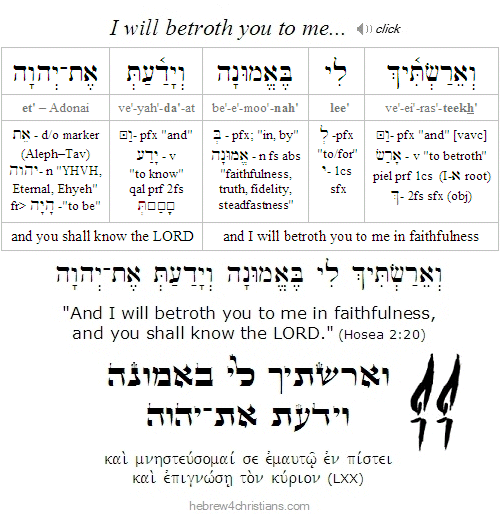 |
Blood over the Tablets...
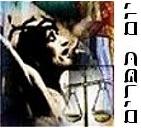
[ Yom Kippur, or the "Day of Atonement," begins this evening at sundown... ]
10.04.22 (Tishri 9, 5783) The earthy Tabernacle (i.e., Mishkan) and its furnishings were "copies" of the heavenly Temple and the Throne of God Himself. Moses was commanded to make the Sanctuary according to the "pattern" revealed at Sinai (Exod. 25:9). As it is written in our Scriptures, "For Messiah has entered, not into holy places made with hands, which are representations (ἀντίτυπος) of the true things, but into heaven itself, now to appear in the presence of God on our behalf" (Heb. 9:24). The centermost point of the earthly Tabernacle was the Ark of the Covenant (אֲרוֹן־הַקּדֶשׁ), a "three-in-one" box that contained God's Holy Word (i.e., the tablets of the Torah). As such, the Ark served as a symbol of kisei ha-kavod (כִּסֵּא הַכָּבוֹד), the Throne of Glory.
The Ark stood entirely apart as the only furnishing placed in the "three-in-one" space called the Holy of Holies (קדֶשׁ הַקֳּדָשִׁים). Upon the cover of the Ark (i.e., the kapporet) were fashioned two cherubim (i.e., angel-like figures) that faced one another (Exod. 25:17-18). According to the Talmud (Succah 5b), each cherub had the face of a child - one boy and one girl - and their wings spread heavenward as their eyes gazed upon the cover (Exod. 25:20). This was the sacred place where the blood of purification was sprinkled during Yom Kippur, the Day of Atonement, and this is the Place (הַמָּקוֹם) that prefigured the offering of the blood of the Messiah, our eternal Mediator of the New Covenant. "For I will appear in the cloud over the kapporet" (Lev. 16:2; Exod. 25:22). As it is written, "I have blotted out your transgressions like a thick cloud and your sins like heavy mist; shuvah return to me (שׁוּבָה אֵלַי), for I have redeemed you (Isa. 44:22).
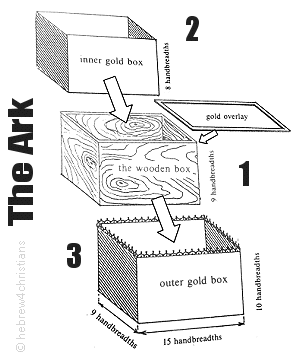 |
The central ritual of atonement given in the Torah is that of the anointed High Priest sprinkling sacrificial blood over the tablets of the law upon the kapporet (the "mercy seat") of the Ark of the Covenant - the Place where "Love and truth meet, where righteousness and peace kiss" (Psalm 85:10). It was from the midst of the surrounding cloud in the Holy of Holies that the Voice of the LORD was heard, just as it was in the midst of the surrounding cloud of darkness upon the cross that Yeshua cried out in intercession for our sins...
חסד־ואמת נפגשׁו
צדק ושׁלום נשׁקו
che'·sed ve·e·met neef·gah'·shoo
tze'-dek ve·shah·lohm na·shah'·koo

"Mercy and truth have met,
righteousness and peace have kissed."
(Psalm 85:10)

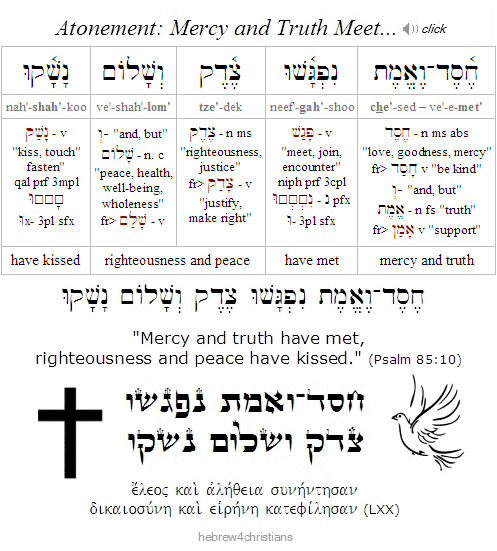
Note further that the High Priest was required to perform the Yom Kippur avodah (service) alone, while wearing humble attire, divested of his glory, and in complete solitude: "No one may be in the tent of meeting from the time he enters to make atonement in the Holy Place until he comes out" (Lev. 16:17). The Hebrew text literally says, "no adam (אָדָם) shall be in the tent," which suggests that something more than the natural man is needed for divine intercession. And just as Moses alone approached God in the thick clouds at Sinai to receive the revelation of the Altar as mediator of the older covenant (Exod. 24:15), so Yeshua, the Mediator of the New Covenant, went through his severest agony on the cross as the darkness covered the earth (Luke 23:44; Matt. 27:45).
The Heart of Atonement...

[ Yom Kippur, or the "Day of Atonement," begins Wednesday, Sept. 15th at sundown... ]
10.04.22 (Tishri 9, 5783) Most of our deepest anxieties come from the fear of death, whether we are conscious of this or not... Death represents fear of the unknown, fear of being abandoned, fear of being rejected, fear of being separated from others, and so on. I am so glad Yeshua gives us eternal life, which for me is not so much about immortality of the soul as it is being loved and accepted by God... That is what "at-one-ment" means, after all (John 17:22-23). Because God loves and accepts us, we trust Him to be present for us, even in the darkest of hours, on the other side of the veil, where he there "prepares a place for us" (John 14:2). As Yeshua said, "I tell you the solemn truth, the one who hears my message and believes the One who sent me has eternal life (חַיֵּי עוֹלָם) and will not be condemned, but has passed (i.e., μετά + βαίνω, lit., "crossed over" [עָבַר]) from death to life" (John 5:24). God's love "crosses over" from death to life and now forever sustains me.
The Torah (in parashat Acharei Mot) provides details about Yom Kippur, or the "Day of Atonement," a special service that gave ritual expression of God's love by making purification for our sins. As I've explained before, the word for love (i.e., ahavah: אהבה) equals the number thirteen (1+5+2+5=13), but when shared it is multiplied: 13 x 2 = 26, which is the same value for the Sacred Name (יהוה), i.e., (10+5+6+5=26). Likewise the Hebrew word for "life" is chayim (חַיִּים), is written in the plural to emphasize that life cannot be lived alone but must be shared. Notice that within the word chayim are embedded two consecutive Yods (יי), representing unity in plurality (Yod-Yod is an abbreviation for YHVH, also indicating the "deep Akedah" of Father and Son). God gave up His life so that we can be in relationship with Him, that is, so that we can be "at-one" with His heart for us.
Whatever else it may mean, then, the Hebrew word for "atonement" (i.e., kapparah, "covering," "protection," "purification," "cleansing," "forgiveness," and so on) is about accepting God's heart for you - being unified in his love - and if you miss that, you've missed the point of the Torah's teaching. Accept that you are accepted in God's heart today.... Thank God we are "sealed" in the book of life by the love of Yeshua!
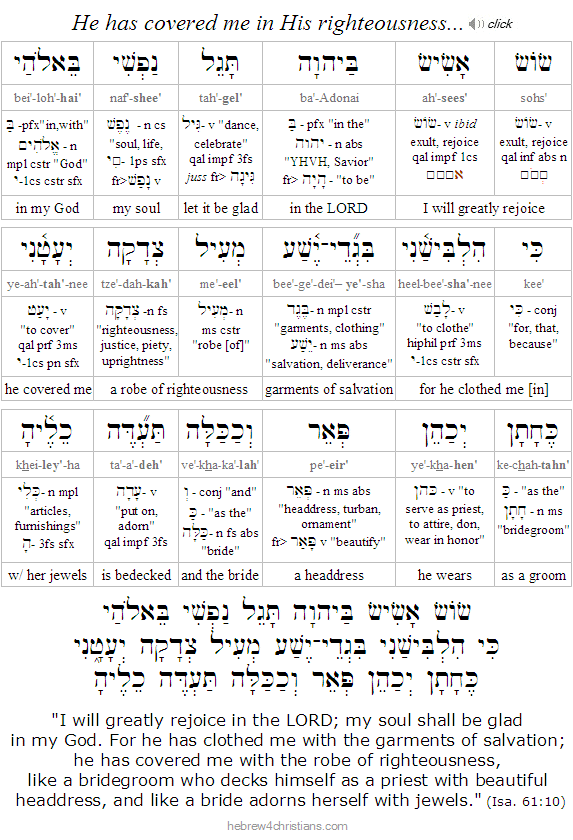 |
Turning to God's Heart...
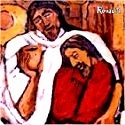
10.03.22 (Tishri 8, 5783) Turning to God in teshuvah, or "conversion," is not something you accomplish in your own strength or will. No, it is an act of grace wherein God touches your heart to make you alive (John 1:11-12). After all, how could it really be otherwise? From our perspective, teshuvah is a matter of trust - first trusting that God loves you and redeems you from the curse of your life, and second, that he will guide you by means of his spirit to know him. Sanctification, then, is the practice of attending ourselves to God's presence, seeking him in our heartache and in our hope, walking with him in our sorrows and in our joys....
Doubts may sometimes arise, however. We may hear questions within our soul asking where we are really going, or questions about the choices we have made. We may feel anxious or uncertain about relationship to God. When this occurs, we must remember who we truly are. We must recall God's personal love for us, even when we feel afraid or lost inside. God's love in Yeshua is the foundation, the solid rock, and the place where we find shelter. It is the very "ground of our being." God's heart is the place where we are never left nor forsaken, even if we have wandered into painful byways of regret and loneliness. Like the prodigal, when we "come to ourselves," when we remember where we really belong, we will rediscover our Father's outstretched arms welcoming us back home (Luke 15:17-24).
Hebrew Lesson
Isaiah 41:13 Hebrew reading (click):
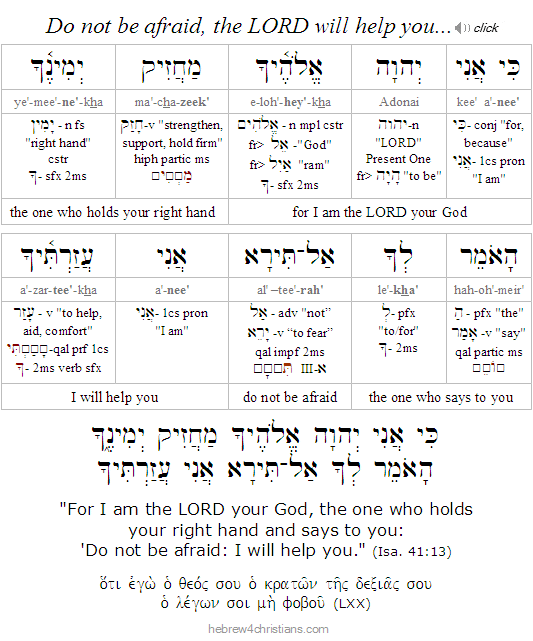 |
Yom Kippur and Jonah...
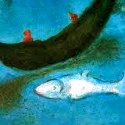
10.03.22 (Tishri 8, 5783) During the afternoon service of Yom Kippur, the Book of Jonah is recited to awaken the heart to "Arise, call out to your God" (Jonah 1:6). Like Jonah we first must be "swallowed up" in consciousness of our own rebellion before we realize we are undone, that we are without remedy apart from God's direct intervention and deliverance. We start there - in the "belly of the fish" - and later are resurrected to go forth by God's mercy and grace. Likewise we first see ourselves as undone and go to the cross, finding pardon and given the power of the ruach HaKodesh to live unto God according to the truth. But note that the imperatives of the New Testament are directed to the new nature given to us by God, and not to the old nature that has been crucified and done away. We are admonished to live in accordance with the truth of what God has done for us through the Moshia', the Savior. You are a new creation, therefore be who you are in the Messiah!
It is noteworthy that Yeshua mentioned the "sign of Jonah the prophet," that is, Jonah's miraculous deliverance after being entombed in the belly of the fish for three days, to authenticate his own claim to be Israel's Redeemer. "Just as Jonah was three days and three nights in the belly of the great fish, so will the Son of Man be three days and three nights in the belly of the earth" (Matt. 12:40). "This is an evil generation. It seeks a sign, and no sign will be given to it except the sign of Jonah the prophet (אוֹת יוֹנָה הַנָּבִיא). For as Jonah became a sign to the Ninevites, so also the Son of Man will be to this generation" (Luke 11:29-30). In other words, the story of Jonah foreshadowed the atoning sacrifice of the Messiah, that is, his death, burial and especially his miraculous resurrection on the third day. Just as God brought Jonah back to life after three days in the belly of the earth, so the resurrection of Yeshua from the dead would vindicate his claim to be the Savior and Redeemer of the world. In this way the "Sign of Jonah" and the sacrificial and atoning work of Yeshua as our High Priest of the new covenant are connected.
"We we were so utterly burdened beyond our strength that we despaired of life itself, yes, we felt that we had received the sentence of death; but that was to make us rely not on ourselves, but on God who raises the dead" (2 Cor 1:8-9). This marks the end of carnal hope, when we realize we are but "dead men walking," and from this extremity of inner desperation and clarity we learn to rely solely on God for what we need. Here we abandon ourselves to God's care, despite the despair, darkness, and fear. We rely on "God who raises the dead," because all other remedies have been vanquished. It is a great gift to be so afflicted, for these "troubles of love" teach us to trust God alone for all we need. The only way out is through. We don't seek an easy way of life, but only that the LORD be with us throughout our troubles...
Hebrew Lesson
Jonah 2:8 Hebrew reading (click):
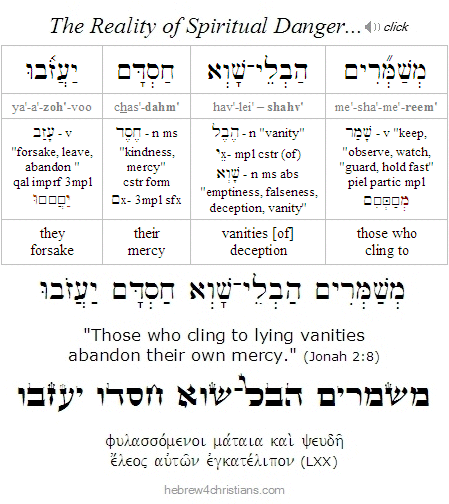 |
Eternally Sealed for Life...

[ "You can rake the muck this way, rake the muck that way – it will always be muck. Have I sinned or have I not sinned? In the time I am brooding over it, I could be stringing pearls for the delight of Heaven." - Martin Buber (1878 - 1965) ]
10.03.22 (Tishri 8, 5783) In post-Temple Judaism (i.e., rabbinical Judaism) it is customary for Jews to wish one another gemar chatimah tovah (גְּמַר חַתִימָה טוֹבָה), "a good final sealing" during the Ten Days of Awe (i.e., the ten days running from Rosh Hashanah until Yom Kippur). The reason for this is that according to Jewish tradition the "writing of God's verdict" (for your life) occurs on Rosh Hashanah, but the "sealing of the verdict" occurs on Yom Kippur. In other words, God in His Mercy gives us another ten days to do "teshuvah" before sealing our fate.... But it's up to us -- and our teshuvah -- to "save ourselves" from God's decree of death. Our merits (mitzvot) are the key: וּתְשׁוּבָה וּתְפִלָּה וּצְדָקָה מַעֲבִירִין אֶת רעַ הַגְּזֵרָה / "Teshuvah, prayer, and charity deliver us from the evil decree."
Despite the teaching of the post-Temple rabbis, however, those who trust in God's salvation put no confidence in man's ability to save himself, but look to the Lord for healing and deliverance. Therefore we find permanent "sealing" for good by the grace and love of God given to us in Yeshua our Messiah (Eph. 1:13, 4:30; 2 Cor. 1:21-22). The Torah's statement that sacrificial blood was offered upon the altar to make atonement (כַּפָּרָה) for our souls (Lev. 17:11) finds its final application in the "blood work" of Yeshua upon the cross at Moriah (Rom. 5:11). The substitutionary shedding of blood, the "life-for-life" principle, is essential to the true "at-one-ment" with God. The ordinances of the Levitical priesthood were just "types and shadows" of the coming Substance that would give us everlasting atonement with God (Heb. 8-10). Because of Yeshua, we have a High Priest of the better Covenant, based on better promises (Heb. 8:6). For this reason it is entirely appropriate to celebrate Yom Kippur and give thanks to the LORD for the permanent "chatimah tovah" given to us through the salvation of His Son. Indeed, Yom Kippur can be read a 'day like Purim' (i.e., יוֹם, "day" + כְּ, "like" + פֻּרִים, "purim"), suggesting that it is a time to celebrate deliverance from our enemies. And since the guilt of our sins and the judgment of death are our two greatest enemies, the great day on which Yeshua sacrificed Himself on the cross is truly the greatest "Purim" of all, because through His loving intervention we are eternally delivered from condemnation and are given everlasting atonement.
It must always be remembered that Torah (תּוֹרָה) is a "function word" that expresses our responsibility in light of the covenantal acts of God. As the author of the Book of Hebrews makes clear: "When there is a change in the priesthood (הַכְּהוּנָּה), there is necessarily (ἀνάγκη) a change in the Torah as well" (Heb. 7:12). The Levitical priesthood expresses the Torah of the Covenant of Sinai (בְּרִית יְשָׁנָה), just as the greater priesthood of Yeshua expresses the Torah of the New Covenant (בְּרִית חֲדָשָׁה).
Still, for the Messianic Jewish believer there is a bit of ambivalence about this holiday, perhaps more than any other of the Jewish year. Part of this ambivalence comes from the "already-not-yet" aspect of the New Covenant itself. Already Yeshua has come and offered Himself up as kapparah (atonement/propitiation) for our sins; already He has sent the Ruach Hakodesh (Holy Spirit) to write truth upon our hearts; already He is our God and we are His people. However, the New Covenant is not yet entirely fulfilled since we await the return of Yeshua to restore Israel and establish His kingdom upon the earth... Since prophetically speaking Yom Kippur signifies national Israel's atonement secured through Yeshua's sacrificial avodah as Israel's true High Priest and King, there is a sense of longing and affliction connected to this holiday that will not be removed until finally "all Israel is saved." So, on the one hand we celebrate Yom Kippur because it acknowledges Yeshua as our High Priest of the New Covenant, but on the other hand, we "have great sorrow and unceasing anguish in our hearts" for the redemption of the Jewish people and the atonement of their sins (Rom. 9:1-5; 10:1-4; 11:1-2, 11-15, 25-27). In the meantime, we are in a period of "mysterious grace" (yemot ha-mashiach) wherein we have opportunity to offer the terms of the New Covenant to people of every nation, tribe and tongue. After the "fullness of the Gentiles" is come in, however, God will turn His full attention to fulfilling His promises given to ethnic Israel. That great Day of the LORD is coming soon, chaverim...
Hebrew Lesson
Psalm 3:8 Hebrew reading (click):
The Day of God's Name...

[ Yom Kippur begins Tuesday, Oct. 4th an hour before sundown this year... ]
10.02.22 (Tishri 7, 5783) Yom Kippur was the only time when the High Priest could enter the Holy of Holies and call upon the Name of YHVH / YHVH (i.e., יהוה) to offer blood sacrifice for the sins of the people. This "life for a life" principle is the foundation of the sacrificial system and marked the great day of intercession made by the High Priest on behalf of Israel. For this reason it was also called the "Day of God's Mercy," or the "Day of God's Name" (יום השם יהוה). This alludes to the revelation of the attributes of God's Compassion after the sin of the Golden Calf (see Exod. 34:6-7) -- a disclosure that foreshadowed the New Covenant. How much more, then, is Yom Kippur the "Day of Yeshua's Name" (יום השם ישוע) since He secured for all of humanity everlasting kapparah (atonement)? Yeshua the Messiah is Moshia ha'olam (מוֹשִׁיעַ הָעוֹלָם), the Savior of the world; He alone possesses the "Name above all other Names" (Phil. 2:9-10; Acts 4:12). It is altogether fitting, then, that God's "hidden Name" (i.e., shem ha-meforash: שֵׁם הַמְּפרָשׁ) was proclaimed before the kapporet (Ark of the Covenant) in the Holy of Holies while atonement for our sins was made through the sacrificial blood.
This gives us a whole new perspective on Paul's words (Rom. 10:9): "if you confess with your mouth that Yeshua is LORD (יהוה) and believe in your heart that God raised Him from the dead (i.e., that his blood was shed and presented on your behalf upon the heavenly kapporet), then you will be saved (that is, you will be reconciled to God and made a partaker of the atoning work of Yeshua). Surely the Apostle Paul, a zealous rabbi who diligently studied Torah in Jerusalem under Rabbi Gamaliel (who was himself the grandson of the renowned Rabbi Hillel the Elder), understood the theological implications when he stated that the prophecy: "And it shall come to pass that everyone who calls on the Name of the LORD (בְּשֵׁם יְהוָה) shall be saved" (Joel 2:32) applied directly to Yeshua (Rom. 10:10).
Hebrew Lesson
Joel 2:32a Hebrew reading (click):
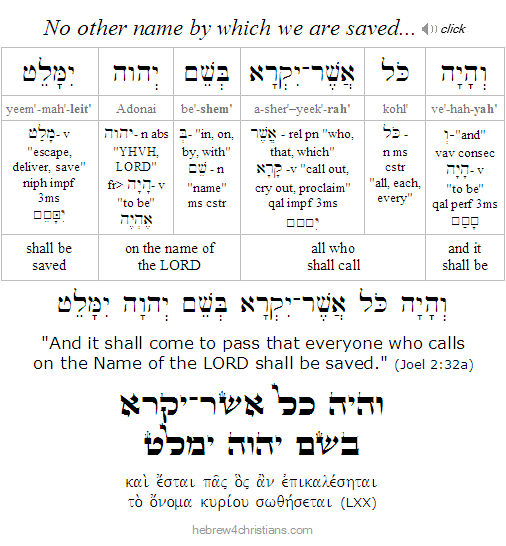 |
Hebrew Lesson
Isaiah 45:23 Hebrew reading (click):
Ha'azinu - Yom Kippur Podcast...
10.02.22 (Tishri 7, 5783) In this "High Holiday" audio podcast, I discuss Yom Kippur (Day of Atonement) and its themes, particularly in reference to the atonement given in the Messiah Yeshua, as well as parashat Ha'azinu, the Torah portion we always read between Rosh Hashanah and Yom Kippur. The Ha'azinu is an amazing prophetic song ("shirah") written by Moses just before he died. Written nearly 1,500 years before the advent of Yeshua, Moses foresaw the climatic events of Israel's history -- its past, present, and most notably its future, including the future time of redemption and atonement at the End of the Age.
The Prophetic Song of Moses...
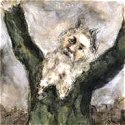
10.02.22 (Tishri 7, 5783) Shanah Tovah, friends! In last week's Torah portion (i.e., Vayeleich), Moses finished his long address to the people of Israel and commissioned Joshua to be his successor. The LORD then foretold that after Moses' death the Israelites would "whore after foreign gods" and break covenant with Him. In light of this, Moses was instructed to teach the Israelites a great prophetic song called the "Ha'azinu." This week's portion provides the words of this song, which foretells of Israel's history (past, present, and the future redemption) and that warns the people not to stray from the path that God had commanded. Structured in the form of an "oracle," the Ha'azinu contains Moses' final words of prophecy given to the Israelites before he ascended Mount Nebo to die.
The oracle begins by declaring the righteousness of God. Moses reminded the people of all that God had done for them and then foresaw all the great gifts they would enjoy as God's chosen nation in the promised land. However, instead of thanking God for all these gifts, Moses foresaw that the people would "grow fat" and forsake the LORD for various "no-gods." This would cause God's anger to burn, and Israel's apostasy would eventually lead to defeat at the hand of their enemies and to eventual exile. All the various curses listed earlier in the covenant would then come upon the people: "I will heap disasters upon them; I will spend my arrows on them; they shall be wasted with hunger, and devoured by plague and poisonous pestilence." Indeed, God would have entirely destroyed the Jewish people were it not for His reputation among the nations, lest they should say, "Our hand is triumphant, it was not the LORD who did all this."
Ultimately, however, God will vindicate his justice and mercy before heaven and earth by saving Israel from her enemies and atoning for all her sins. The song ends, "Cry out, O nations, with his people, for he will avenge his servants' blood; he will take vengeance against his enemies, and will atone for his land and his people."
After Moses recited the words of this song, he encouraged the people to take the words of his prophecy to heart and to teach them diligently to their children. "For it is no empty word for you, but your very life, and by this word you shall live long in the land." The portion ends with Moses ascending Mount Nebo so that he could see the Promised Land before he died.
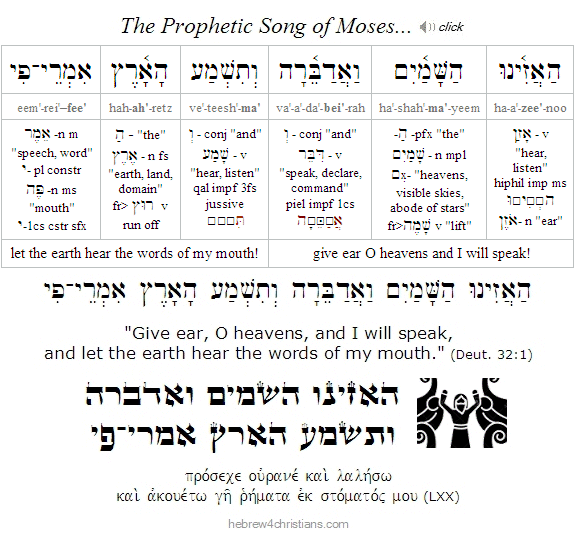 |
We read the Ha'azinu every year near the High Holidays, either just before or just after Yom Kippur. In the Sefer Torah (Torah Scroll), the prophetic song is written in a stylized two-column format with extra spaces. Each line of the shirah (song) is matched by a second, parallel unit (Talmud: Shabbat 103b).
The Ha'azinu reminds us that who we listen to ultimately decides our fate. It begins, "Give ear, O heavens (הַאֲזִינוּ הַשָּׁמַיִם), and I will speak, and let the earth hear (וְתִשְׁמַע הָאָרֶץ) the words of my mouth" (Deut. 32:1). The word ha'azinu (הַאֲזִינוּ) comes from verb azan (אָזַנ), as does the Hebrew word for "ear" (i.e., ozen: אזֶן). The Midrash Rabbah says that the ear (אזֶן) gives life to all the organs of the body. How so? By listening (שׁמע, shema) to the Torah. This idea is repeated in the New Testament: "Faith comes from listening to the Word of God" (Rom. 10:17). The Word of God (דְּבַר־אֱלהִים) is our very life, friends...
Prayer request: Please remember me (John) in your prayers, friends... Thank you.
<< Return
|






















